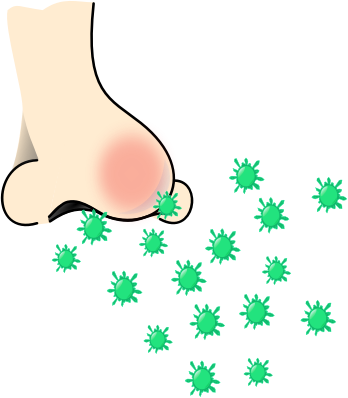Is Natural Immunity Better?

Natural Immunity and Muscosal Antibodies
A reader asked about a friend who is “monitoring his immune level” as a way to protect himself against COVID19 without getting vaccinated. This friend also believes “discussion about natural immunity is being suppressed.”
Monitoring Your Immune Level
To say you are “monitoring your immune level” is akin to saying you are monitoring your health. Neither health nor immunity is a single thing, but rather a complicated mixture of many things. You can certainly find measures that give you a sense of your health or immune status, but it’s not like there is a test or even a batch of tests that can say you are “healthy” or “immune” unless you mean something very specific by “healthy” (such as, my kidneys are working well) or “immune” (such as, I have antibodies against the SARS-CoV-2 virus that causes COVID19).
There are things you can do to keep your immune system in tip-top shape. These are generally the same things that maintain health in all your body’s systems: a well-balanced diet rich in plants and fiber; frequent vigorous exercise; plenty of sleep; low stress. A person who is avoiding vaccination would be wise to do these things so that their immune system is as ready as possible to fight off any infection.
But these actions are no substitute for vaccination. General immune health is like weight lifting for a football player: it enables your body to do the job, but is no substitute for training in the actual skills of the game. A vaccine trains your healthy immune system in a specific skill: fighting off a particular virus. If your immune system is compromised, vaccines don’t work as well, just as a weak athlete won’t play the game well even with lots of practice.
So why can’t you skip the vaccine and let your healthy immune system do its job?
Well, you can, of course, and it usually works. But you’re taking a risk. Without advance vaccination, your immune system has to learn how to fight coronavirus while the virus is multiplying in your body. This takes time and may mean you get sick before your immune system can clear things up.
Monitoring Antibodies
Can you “monitor your immune level” in a way that makes it reasonable to skip COVID vaccination? No.
If a person is looking for a reason not to get vaccinated, in theory they could sample their blood and test it for the two most important parts of the specific immune response: antibodies against the coronavirus, and T cells that recognize the coronavirus. In theory, if they already have plenty of both from a previous infection, they should not need a vaccine.
In practice, this is not possible to do.
Regarding T cell immunity: Only a small number of research laboratories in the whole world are able to do that kind of analysis of T cells. No ordinary person can measure their T cell activity against COVID.
Regarding antibodies: Tests that measure whether a person has antibodies against COVID in their blood do exist. Whether they are available to an average person, I don’t know. If accurate, such a test could tell you whether you have ever been exposed to the virus. But merely having antibodies does not guarantee that they are the right kind, quality, and quantity to protect you from illness. Vaccination is more of a sure thing.
All immunity is natural
When people talk about “natural immunity,” they mean immunity that you get from being infected by a live virus in the wild via the route the virus normally enters the body (nose/lungs for COVID, mouth/gut for polio, etc.) People may view this as somehow superior to immunity acquired any other way. It’s not. Your immune system doesn’t care whether its target is natural or artificial.
In all cases, natural immunity is more dangerous than vaccination. Vaccination may not be 100% risk-free, but it is always safer than giving a virus the opportunity to make a run for it. In many cases, vaccination is also stronger and more durable than immunity from natural infection.
Natural immunity does have some advantages, however. For some viruses, surviving an actual infection may give lifelong immunity in a way that vaccines do not. While surviving rabies might guarantee you’ll never catch rabies again and vaccination means you have to get boosted every year, I wouldn’t say that natural infection is “better” than a rabies vaccine. I’d rather get boosted than die.
The Pfizer and Moderna vaccines against COVID19 are so effective that they may be better than natural COVID infection—and of course they’re safer too.
The problem with COVID shots
The current crop of COVID19 vaccines do have one glaring and problematic shortcoming compared to natural infection. Maybe it hasn’t been publicly discussed enough, and so people think discussion is being “suppressed.”
Moderna, Pfizer, and Johnson & Johnson vaccines are all delivered by injection into a muscle. There, the vaccine encounters immune cells that are active in the blood and internal organs. Those cells learn how to recognize the coronavirus and will be on guard against the virus if it ever enters the blood or internal organs. Injected vaccines stimulate production of antibodies called IgG class. IgG make up about 75% of the antibodies in your blood.
This means the current US vaccines are very good at preventing COVID disease in the lungs. Which is wonderful, because it’s mostly the lung disease that kills people.
However, the immune system works differently in the parts of the body that touch the outside world. These “mucosal membranes” include the lining of your mouth, throat, sinuses and nose. The antibodies in your nose are a different class (IgA). Vaccines injected into muscle largely fail to produce these mucosal IgA antibodies.
This is the main reason why vaccinated people can still test positive for the coronavirus, can still get the sniffles, yet are well protected against pneumonia. They have excellent immune protection on the inside, but not very good protection in their nose and upper respiratory tract.
Natural infection delivers the coronavirus directly into the nose. Immune cells in the nasal mucosa encounter the virus and will make IgA antibodies against it. Compared to people who are vaccinated by injection only, I expect people who have had a natural COVID infection will have better immunity in their nose but similar or worse immunity in their blood.
In simple terms, if you want antibodies in your nose, you need to deliver some virus or vaccine to the nose.
A different vaccine?
The best of both worlds would be a vaccine that prevents disease in the lungs AND stimulates mucosal immunity to stop the virus when it first enters the nose.
A vaccine given as a spray directly into the nose could be part of the answer.
Nasal vaccines do exist. There is one for influenza (flu) called FluMist that is approved for people ages 2-49. Kids love that there is no needle stick; I used to request FluMist for my children.
Nasal spray vaccines against COVID are in development. An Indian one (Bharat Biotech) is in a phase 3 clinical trial for use as a booster in people who have already received two doses of an injectable vaccine. (source) This regimen could give the ideal combination of systemic and mucosal immunity against the virus.
Questions? amy@amyrogers.com
Amy Rogers, MD, PhD, is a Harvard-educated scientist, novelist, journalist, and educator. Learn more about Amy’s science thriller novels at AmyRogers.com.


